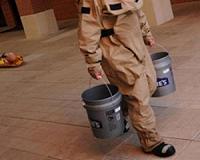| . |  |
. |
Port-Au-Prince (AFP) June 9, 2010 Before the earthquake ripped through Haiti in January, Anne Luze Denestant had never really thought about what life would be like as a disabled person in the impoverished Caribbean nation. Then on January 12, the earth convulsed bringing a wave of destruction to the capital Port-au-Prince, killing some 200,000 people, and trapping Denestant under the rubble of her home for three days. When rescuers finally pulled her out, she had to confront the knowledge that doctors were unable to save her left arm. "I knew that before they told me," said Denestant. The 26-year-old asked doctors to amputate her arm in the hope her pain would stop. "I just decided to let it go." Now she's joined the swelling ranks of Haiti's disabled, who are finding a new power and new voice in a country where they were once hidden behind closed doors. An estimated 2,000 to 6,000 people were left with some kind of disability by the quake, which struck across all classes and social strata. They join the 800,000 disabled people who already lived in the country before, according to figures from Handicap International. Recent amputee Denestant, 26, met Beatrice Leveille, 30, who has walked with crutches since contracting polio when she was three, at a recent workshop to empower Haiti's disabled, organized by international charity Christian Blind Mission. "For me being disabled used to mean being someone who can't do anything," said Leveille, who now represents the Association of the Handicapped in Carrefour (ASHCAR). "We have made some progress but it's going to be a long fight," acknowledged Odnel Eleazard, a project manager for the Christian Blind Mission. Haiti is a signatory to the 2009 United Nations Convention on the Rights of Persons with Disabilities and recently passed a bill for the integration of people with handicaps. But calling for integrated education and greater mobility, Eleazard sees the scores of new disabilities caused by the earthquake as an opportunity for Haitians to move beyond past prejudices. "Now that we have to re-plan the country for everyone we should do that by including the handicapped," he said. The earthquake is also an opportunity for Haitians to move beyond the culture of stigmatization that has long surrounded disability, the workshop participants said. "In a country where 10 percent of the population is disabled, you could spend a week here and never see any," said Josue Joseph, a spokesperson at the Secretariat for Integration. "Parents would lock up their handicapped kids at home." People also tended to associate disability with poverty, Joseph added, suggesting the earthquake is likely to revolutionize Haitians' perception. "Now there are amputees at all levels, in the upper class, the middle class and the working class," he said. "January 12 proved that we are all potential handicapped." Eleazard's organization has visited buildings to evaluate accessibility and is providing guidelines on how to reconstruct the leveled city, with the needs of the handicapped also being considered. The campaign, for the moment, is limited to Port-au-Prince, because of lack of greater resources, but Eleazard added there is an enormous need to deal with the question of disability outside the capital as well. Four months on Denestant is adjusting to her new life, living in a crowded refugee camp. "I can do the same things as before except for combing and washing hair," said the woman, who used to braid hair for a living. She hopes to continue her studies at some point. "I'm strong, I don't think about my arm," Denestant said. "But living in that camp is not a life." Luis Metayer, 47, has been walking with a prosthesis since losing a leg in a car accident 15 years ago. An advocate of disabled rights since then, he is now working to ensure amputees have access to the care and services they need. "Do you know how many prostheses a child will need to change while he is growing up?" he asked, saying Haiti's entire health system has been able to provide only about 130 prostheses a month. Metayer said a second wave of amputations is now taking place because of the poor treatment many received after the earthquake, leading to infections. While he sees some hope with the development of the new advocacy movement, he fears little help will be available to those in need in the near future. "With all this money, all these NGOs coming into Haiti, what has been truly done to help the disabled?" Metayer asked. But he vowed to continue to fight to give the disabled a dignified life. "Otherwise those in charge are gonna see a one-legged man kick," he laughed.
Share This Article With Planet Earth
Related Links Bringing Order To A World Of Disasters A world of storm and tempest When the Earth Quakes
 Developing Next Generation Hazmat Boots
Developing Next Generation Hazmat BootsRaleigh NC (SPX) Jun 03, 2010 The rubber boots that emergency personnel wear when responding to situations where hazardous materials (HazMat) are present may be functional, but they're not very comfortable. New research coming out of North Carolina State University hopes to provide a next generation HazMat boot that meets both criteria. "We've learned from firefighters and other first responders that the current rubber ... read more |
|
| The content herein, unless otherwise known to be public domain, are Copyright 1995-2010 - SpaceDaily. AFP and UPI Wire Stories are copyright Agence France-Presse and United Press International. ESA Portal Reports are copyright European Space Agency. All NASA sourced material is public domain. Additional copyrights may apply in whole or part to other bona fide parties. Advertising does not imply endorsement,agreement or approval of any opinions, statements or information provided by SpaceDaily on any Web page published or hosted by SpaceDaily. Privacy Statement |